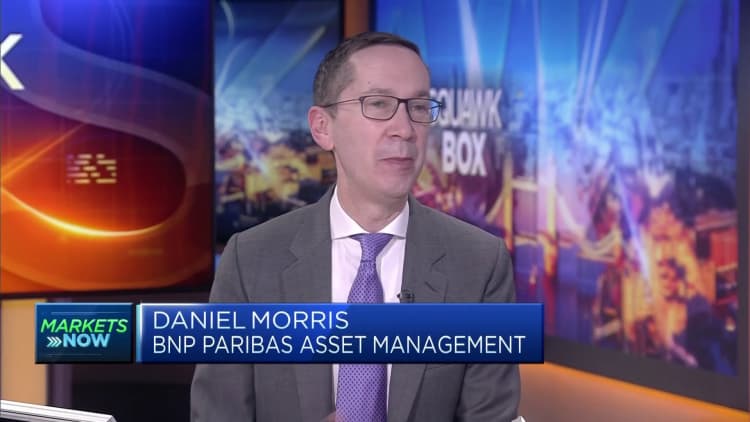Traders work on the floor of the New York Stock Exchange during morning trading on April 29, 2024 in New York City.
Michael M. Santiago | Getty Images
European stocks are now more attractive than their U.S. counterparts, according to Swiss Bank UBS, with factors such as economic data, interest rates and earnings playing a key role.
In a note entitled: “A U-Turn: Favouring Europe over US equities,” the bank’s strategists said European stocks excluding the U.K. now outrank the U.S. on its “regional scorecard.” Japan is top of its list, the U.K. is second and Europe comes in third.
UBS outlined a number of reasons for its “U-turn,” especially given U.S. markets tend to outperform European ones.
Economic momentum
UBS’ call might come as a surprise given that U.S. economic growth has vastly outperformed of late, with U.S. GDP coming in at 1.6% for the first quarter of 2024 while eurozone GDP came in at 0.3% over the same period. However, UBS forecasts that this gap between the two regions could soon close.
Indicators tracked by the bank — such as purchasing managers’ index (PMI) data — suggest an upside risk to European GDP, and a downside risk to U.S. GDP, the bank said.
Excess savings in Europe are also higher, and not as widely used as in the U.S., and bank lending conditions for companies are looser in Europe which also could benefit growth, UBS noted.

Monetary policy is another key area to watch, the Swiss bank said. Some of Europe’s central banks have already begun easing, and the European Central Bank is expected to do so as soon as June. With inflation easing more steadily in Europe than the U.S., the “path to lower rates is much clearer,” UBS said.
Models also show that rate cuts in Europe are set to boost the economy more than they will in the U.S., UBS said.
Valuations
Europe’s valuations have also started to look more attractive in recent months, UBS said. The so-called equity risk premium (ERP) — or the excess return on investing in stocks compared to risk-free alternatives — is far higher in Europe than the U.S., the bank found.
“The ERP in Europe is 2.1pp [percentage points] above the US, close to a record high. The sector adjusted P/E at 18% below the US has only been at similar or lower levels when there is a recession/Eurozone crisis. We have neither,” the strategists highlighted.
Earnings momentum
Relative earnings momentum is also “moving in Europe’s favor,” UBS said, with a weaker euro and stronger PMIs expected to boost earnings revisions.
“European profit margins (critically, ex financials) are far less extended than the US, and in the US 67% of the margin improvement came from unsustainable factors (lower rates and lower tax) compared to just 3% in Europe,” the strategists wrote.
Finally, while Europe is seriously lacking in technology stocks — which has been a key factor in its underperformance — around 40% of its market cap is made up of companies that are industry-leading or unique, UBS said, and don’t have any U.S.-based direct competitors.

